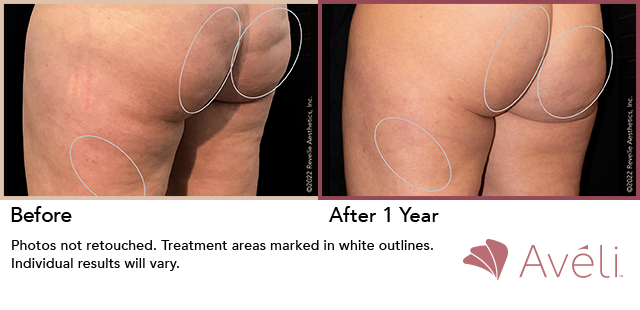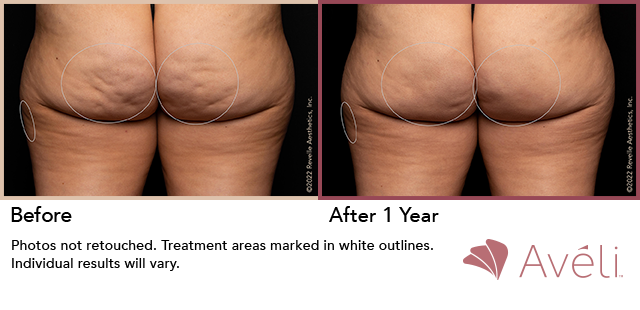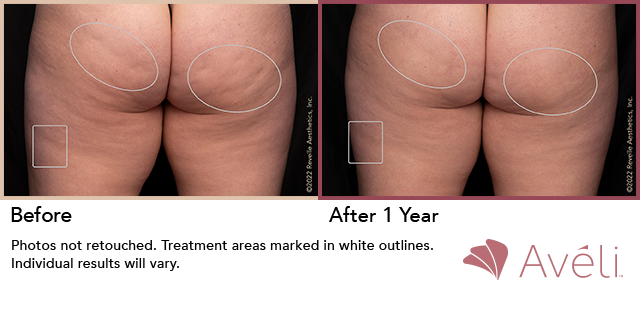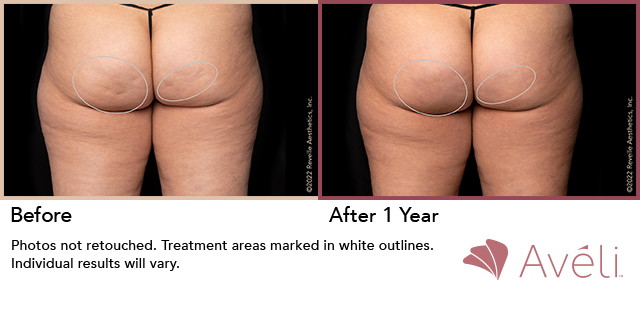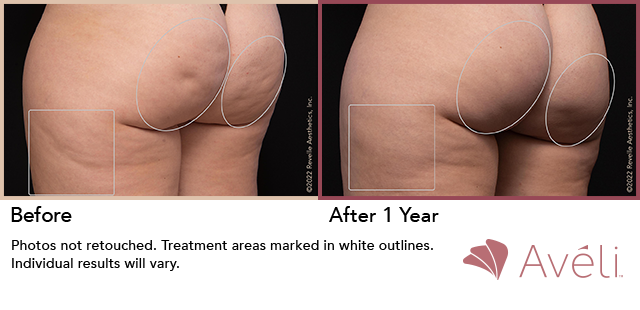Long-Term Cellulite Reduction
Dr. Holland is excited to be one of the first to offer Avéli™ for a meaningful and lasting reduction in cellulite dimples!
what is Avéli™?
Avéli™ is a no-nonsense approach to treating cellulite based on a deep understanding of women’s anatomy. While many treatments approach cellulite blindly from the outside-in, Avéli™ identifies and releases the primary structural cause of cellulite from the inside-out in a single minimally-invasive procedure with little downtime.
What is cellulite?
Cellulite is a depression of any shape or size with defined edges seen on the surface of the skin, typically on the buttocks or thighs. A major underlying cause of cellulite are the fibrous bands that tether your skin to the structures below. These bands are called septa. Some septa are good (and you want them as connective tethers), but others stiffen or shrink over time and lead to the dimples we see on the surface and call cellulite.
It’s important to distinguish cellulite from other concerns like laxity or localized fat, which we can talk you through during a consultation in our office. You should also know that cellulite is not your fault (genetics and hormones play a role), and you are not alone – up to 90% of women have it!
How to reduce cellulite
Avéli™ is an option for a range of women across the cellulite severity spectrum. The procedure is performed by one of our trained providers and uses a handheld device to manually target and release the complicated web of septa bands causing cellulite dimples.
Avéli™ addresses the primary structural cause of cellulite in 3 steps:
1. Your provider guides the Avéli™ device under the skin directly to the targeted dimples.
2. After your provider identifies the culprit septa bands causing a dimple, those septa are precisely released.
3. Your provider can confirm their release in real-time, delivering visibly smoother skin quickly after the procedure.
Avéli™ at holland plastic surgery
meet jamie
Avéli™ produces results
Disclaimer: Individuals results and experience may vary.
your questions answered
Q: Are there any side effects?
A: In the clinical study, the most common side effects reported were mild pain within the first 24 hours and bruising and tenderness to the touch which typically resolved within 30 days. Small areas of firmness, usually not visible or painful, typically resolved in a couple of months.
Q: How quickly will I see improvement in my cellulite?
A: Avéli™ cellulite reduction results should be visible once swelling and bruising subsides. By one-month post-procedure you should start to see the effects of the procedure.
Q: Can I work out or exercise after the procedure?
A: It is recommended to avoid any strenuous activities or workouts in the first few days/weeks after the procedure to allow the area to heal.5 We will provide you with complete post-procedure expectations and recommendations.
Q: How long will the results last?
A: Participants in the clinical study demonstrated a lasting reduction in the appearance of their cellulite when assessed one year after the procedure.
Q: How do I know if Avéli™ is right for me?
A: If you are a woman looking for long-term reduction in cellulite dimples from a single, minimally invasive in-office procedure, Avéli™ could be for you! Schedule a consultation with us to determine if you are a candidate.
Q: Does Avéli™ only treat cellulite dimples?
A: Avéli™ treats the septa bands causing cellulite dimples. It is not a procedure that addresses other concerns often seen alongside cellulite, such as laxity (loose skin) or localized pockets of fat.
Q: Will I need multiple sessions?
A: Nope! During a single cellulite procedure, a provider can fully treat the targeted cellulite dimples on both your buttocks and thighs.
Q: How long does the procedure take?
A: A typical procedure will take around an hour, including local anesthesia and the procedure itself. Exact timing will vary depending on the personalized procedure plan from your provider.
Q: Is there any downtime after the procedure?
A: Little to none. In the clinical study, most patients returned to normal activities within 24-48 hours.






